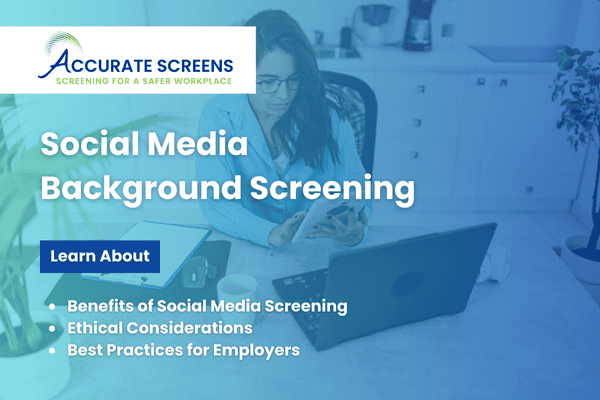In today’s digital age, social media screening has become a crucial part of the hiring process. Companies are increasingly using social media background checks to vet potential employees before bringing them on board. But what about after they’re hired? Is there value in continuing to monitor employees’ online activities once they’re part of the team? We’ll review the differences between pre-hire and post-hire social media screening, exploring why both are essential for maintaining a safe, compliant, and reputable workplace. Social media screening involves evaluating candidates’ online presence to gain insights into their character, professionalism, and cultural fit. This process helps organizations improve workplace culture, reduce turnover, mitigate risk to their brand and reputation by aligning a candidate’s character to corporate values. risk. Comprehensive social media checks are performed across the most widely used social media platforms.
According to a CareerBuilder survey conducted in 2017, 70% of employers use social media to screen candidates before hiring. Of those employers, more than 50% said something was discovered that led to the candidate not being hired. Studies have shown that most employers are simply logging onto their personal Facebook or LinkedIn accounts and casually browsing a candidate’s social media posts. This approach can put a company at risk of violating EEOC protected class information as well as Fair Credit Reporting Act (FCRA) rules. The best approach is to outsource this function to a background screening firm or Consumer Reporting Agency (CRA) that follows FCRA rules and regulations which should ensure the process is consistent and fair. Doing so assists with avoiding potential legal and privacy issues.
It allows companies to make informed choices while respecting candidates’ privacy. This post explores best practices, ethical considerations, and the impact of social media screening on employment decisions.
Understanding Social Media Screening
Social media screening refers to the practice of researching a job applicant’s profiles and activities on social networking platforms. The goal is to identify any concerning behavior or background information before making a hiring decision.
This process has become increasingly important in modern recruitment. Companies aim to mitigate risks associated with hiring. A negative online presence can indicate potential issues that may affect workplace culture or safety.
Machine learning and natural language processing flag legally defensible public posts based on 11 behaviors plus optional keyword flagging. Original posts, comments, replies, likes, and shares are analyzed. Customized flagging based on text and image content is also available. Social media reports are typically available within an hour. All reports are reviewed utilizing a quality assurance process, using a human to ensure maximum accuracy.
Types of Social Media Checks
There are two main types of social media checks: pre-employment screenings and post-hire social media monitoring. Pre-employment screenings focus specifically on candidates for open positions. These checks occur after an interview but before a job offer is made.
Common Red Flags
Certain behaviors raise significant concerns during social media screenings. Unlawful activities, such as drug use or criminal behavior, are major red flags. These actions can lead to liability issues for employers if hired.
Discriminatory comments also pose serious risks. Racist or sexist remarks reflect poorly on a candidate’s judgment and values. Employers seek individuals who align with their company culture and ethics.
Violent behavior is another significant concern during screenings. Posts that glorify violence or aggression can indicate potential risks in the workplace. Sexually explicit material raises alarms about professional conduct.
- Derogatory Comments:
- Personal attacks on individuals’ appearance, intellect, or physical attributes
- Substance-Related Content:
- Visual depictions of substance paraphernalia or consumption
- Graphic Imagery:
- Disturbing visuals such as severe injuries, violent aftermath, or medical trauma
- Explicit Material:
- The presence of pornographic content or overtly sexual imagery
- Discriminatory Behavior:
- Hostile or threatening language targeting specific demographics
- Offensive Language:
- Use of vulgar expressions, profanities, or crude terminology
- Self-Destructive Indicators:
- Expressions of self-harm intentions or suicidal thoughts
- Inappropriate Sexual Content:
- Posts with sexually demeaning or harassing undertones
- Violent Tendencies:
- Expressions of intent to cause harm or endanger others
- Custom Keyword Alerts:
- Flagging system based on specific terms or keywords set by the employer. Keywords can be designated negative, positive, or neutral.
Benefits of Social Media Screening
The many benefits of performing social media screening on candidates include:
- Brand Protection. Hiring candidates that reflect your core brand is paramount with maintaining your company’s brand.
- Employee Protection. Not only our corporate security personnel responsible for workplace safety; human resources plays an important role to ensure the employees hired do not represent a threat to other employees.
Turnover Reduction. Studies have shown hiring a toxic employee is over $12,000 not including the lost of team productivity.
Ethical Considerations
Legal Implications
The FTC ruled on social media screening in an opinion letter in 2011. You must comply with the Fair Credit Reporting Act (FCRA), and an employer can only screen posts that the candidate has made publicly.
- Only access public post
- Get permission from your candidate
- Don’t ask for passwords to their social media accounts or accept friend requests. This can violate many state’s social media privacy laws.
Following the steps above ensures your social media screening process remains fair and lawful.
Legal risks are significant when conducting social media checks. Discrimination claims may arise if employers use biased criteria during their evaluations.
Complying with employment laws and regulations is essential. Laws vary by state and country, affecting how employers conduct screenings. Utilizing a CRA that consistently follows all FCRA rules and regulations can provide guidance through these complex legal landscapes and assist with conducting compliant and legally defensible social media screening.
Privacy Concerns
Social media screening can lead to potential violations of personal privacy. Employers conducting social media checks independently may access private information that candidates do not intend to share. This raises ethical questions about what is acceptable in the hiring process.
Candidate Consent
Obtaining explicit consent from candidates before social media checks is vital. Candidates should understand what information will be reviewed and why it matters for their application. Transparency builds trust between employers and applicants.
Informing candidates about the screening process should include details about the specific platforms checked. This clarity helps candidates prepare and respond appropriately. Ethical considerations demand that employers respect candidates’ rights throughout this process.
Best Practices for Employers
Developing a Policy
Employers should create a clear, written policy on social media screening. This policy will guide the process and set expectations. It must include specific guidelines on what will be checked. For example, employers might look at public posts, comments, and photos.
The policy should also explain how findings will be used in hiring decisions. This transparency helps candidates understand the implications of their online presence. Communicating this policy to all relevant stakeholders is crucial. Everyone involved in the hiring process needs to know the rules.
Position-Specific Guidelines
Employers must tailor social media screening criteria based on the specific role being filled. Different positions require different skills and behaviors. For instance, a customer service role may prioritize communication skills. In contrast, a technical position may focus more on problem-solving abilities.
It is essential to consider the relevance of certain behaviors or posts to job responsibilities. Posts that show professionalism may be valuable for many roles. However, personal opinions may not matter as much to others. Avoiding a one-size-fits-all approach ensures fairness and relevance in the screening process.
Ensuring Fairness
Implementing standardized procedures is vital for consistency in social media screenings. Working with a CRA can assist with implementing a standardized approach to reduce the risk of bias and promote fairness.
Corroborating findings from social media with other data points, such as work history or references, leads to more informed decisions about candidates.
Leveraging Technology
AI and machine learning play a significant role in automating social media screenings CRAs use. These technologies can quickly analyze every post and image content, providing a broad-based and thorough analysis. They identify patterns and flag content that may raise red flags. Automation makes the process more efficient and less time-consuming.
Using technology also helps reduce bias during screenings. Automated systems focus on objective data rather than personal opinions. However, limitations exist. Algorithms might misinterpret context or overlook important nuances. Human oversight remains crucial to augment AI and sentiment analysis for fair evaluations of candidates by ensuring the correct identity and accuracy.
Improving Candidate Experience
Transparency and communication are vital throughout the screening process. Providing opportunities for candidates to explain their online presence fosters a positive experience. This approach allows applicants to contextualize their actions and provides insight into their character.
Striving for a respectful experience is essential for all applicants. Employers should recognize that social media does not capture the full picture of an individual’s capabilities. A positive candidate experience can enhance employer branding and attract top talent.
Ensuring Compliance
Adhering to Laws
Staying updated on relevant laws is crucial. Social media screening must comply with various regulations. Data use and protection laws and regulations are constantly evolving. Many CRAs regularly review and update screening practices and assist employers with aligning with nationwide and global legal requirements to minimize penalties, lawsuits, or reputational damage.
Closing Thoughts
Social media screening is a vital component of modern hiring practices. It offers employers insights into candidates’ personalities and professional behaviors, enhancing the hiring process. Ethical considerations and compliance with legal standards are crucial in conducting these screenings. Adhering to best practices ensures fairness and transparency, fostering trust between employers and potential employees.
Employers are encouraged to implement structured social media screening protocols. Many CRAs, such as Accurate Screens, can assist with ensuring a consistent approach and protocol is used. This approach mitigates risks and aligns with organizational values. By prioritizing ethical standards and compliance, employers can make informed hiring decisions that benefit both the company and its workforce. The implications of effective social media screening extend beyond recruitment; they contribute to a positive workplace culture. Employers should reflect on their current practices and consider integrating comprehensive social media screening strategies into their hiring processes for a comprehensive background screening approach.


